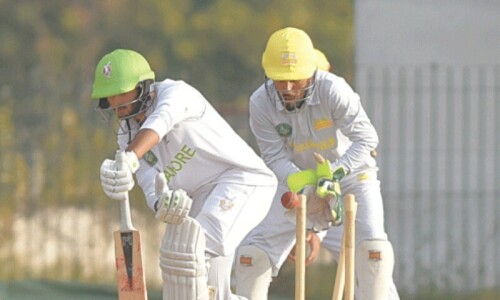For several years now, Balochistan’s budget has run into significantly large to massive deficits. This year, the deficit was over 17 per cent of its current and development expenditure combined. The deficit in the provincial budget for the next financial year is projected to be Rs47.7bn or 11.4pc of the total estimated spending.
Usually, provincial deficits aren’t taken seriously because, unlike the federal government, the provinces can borrow a very limited amount of money to fund their income gap. Provinces are only allowed to cumulatively borrow up to just 0.85pc of the GDP at any given time and the share of each unit from this amount is determined according to its assigned share from the federal divisible tax pool under the National Finance Commission (NFC) award.
To borrow more they require permission from the federal government. Besides, the provinces are required to somehow “balance” their budget at the end of each fiscal through “savings” (read cuts) in development and current spending allocations, or defer essential payments to the next fiscal.
‘Lack of public investment in Balochistan means that the province lags far behind other federating units in every sphere of life’
In case of Balochistan, the practice of booking deficits in its budgets year after year is an indirect way of making an argument for more resources to the province; the deficit budgeting is actually its ‘cry for help’ from the federation.
Indeed, the federal transfers — cash from the divisible tax pool and the straight transfers — to Balochistan have grown substantially after the implementation of the last NFC award back in 2010. So have its expenditures, especially its current spending on account of a consistent raise in its pay and pension bill and expenditure on law and order owing to increased terrorism.
Mahfooz Ali Khan is a private member representing the Balochistan government in the ongoing negotiation on the 9th NFC award. He points out that the provincial expenditure on law and order has spiked from just Rs1.7bn in 2004-05 to Rs48bn in the budget for the next year as the “theatre of terrorism has shifted to this part of the country in the last several years”.
That is not all, the government’s pay and pension bill is surging. Absence of industry in the province, a very small agricultural sector and underdeveloped mineral sector, has resulted in the government becoming the largest employer.
“The provincial post-retirement bill has grown by more than a fifth from Rs28bn currently to Rs34bn. How can you reduce this expenditure?” he adds. Defending the incumbent government, Mr Khan said that wherever possible it had tried to reduce its current expenditure in 2019-20 to protect its development plan that has ultimately been revised downwards by a whopping 52pc to Rs42.2bn.
Like many others, he complains that the decades of lack of public investment in Balochistan meant that the province lags far behind other federating units in every sphere of life. “In this sparsely populated province, the per capita cost of providing public services — education, healthcare facilities, drinking water, roads, and so on — is many times higher as compared to the rest of the country.
“How can you expect a government to uplift the population from poverty by spending such small amounts on development schemes? Out of billions of rupees spent in the country around the China Pakistan Economic Corridor (CPEC) initiative, the federal government has spent just $0.66bn under the early harvest projects,” argued Mr Khan who was once the finance secretary of Balochistan.
The source of almost 90pc provincial income is Balochistan’s share from the divisible pool or straight transfers as it has a very limited space to collect provincial taxes including the sales tax on services because of the largely absent or underdeveloped private sector.
Continuing religious terrorism and Baloch insurgency have driven many service providers out of the province. The province has already staked a claim for higher share from the divisible pool under the next NFC award to somewhat cover the development gaps with the rest of the country.
But few believe it will get an increase in its share in the next award. The only hope of increased transfers to Balochistan lies in the success of efforts to spike the tax-to-GDP ratio to 15pc or above over the next few years. For the time being the province will have to find ways to prudently use the available resources for the betterment of its people, and plug widespread leakages in its development funds.
Published in Dawn, The Business and Finance Weekly, June 24th, 2019













































